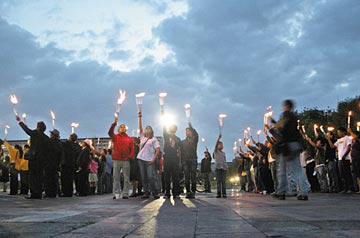
|  |  |  Editorials | Issues | May 2009 Editorials | Issues | May 2009  
Amnesty Lambastes Mexico's Culture of Impunity
 Nacha Cattan - The News Nacha Cattan - The News
go to original


| | (Cuartoscuro/Sashenka Gutiérrez) |  |
The nation's human rights commissioner this week dismissed a new Amnesty International report as a "rehash" of what his commission has been saying for years.

José Luis Soberanes, the president of the National Human Rights Comission, or CNDH, called Amnesty's conclusions regarding Mexico a "refrito," or rehashed, during a conference in the Senate this week.

"It does not add anything new and repeats reports and situations well known in each of the areas it explores," the CNDH said later in a statement.

Released on Thursday, Amnesty International's annual human rights review of over 150 countries criticized Mexican authorities for making few inroads to combat impunity.

Mexico is one of 19 countries that Amnesty considers a "high priority" due to precarious conditions on the ground. The report includes a series of grave violations committed by military and police as well as violence directed at women, journalists and human rights defenders - the latter of which is most disturbing, Amnesty's Mexico director, Alberto Herrera, told The News.

As examples, the organization highlights the arrests of indigenous activists on "fabricated" charges of murder in Ayutla, Guerrero, and repeated threats and reprisals faced by migrant activists providing humanitarian assistance and documenting beatings of migrants in Ciudad Ixtepec, Oaxaca. Such abuses are rarely punished while those apprehended, such as military personnel, do not undergo rigorous trials.

"Impunity is practically the norm," Herrera said. "All three levels of government - municipal, state and federal - have a responsibility in this."

Herrera responded to Soberanes' comments by criticizing the commission for its own failures in handling abuse cases in Mexico, saying the CNDH does little to pressure abusive parties to follow the commission's recommendations.

The CNDH and international rights groups have been sparring since the New York-based Human Rights Watch published a lengthy report in February 2008 accusing the commission of sitting on its hands while rights violations occur. Amnesty has also weighed in against the commission.

Herrera said Amnesty's four-page section on Mexico was researched by a local investigative team that focuses exclusively on the country. Only two other countries in Latin America, Brazil and Colombia, receive such thorough treatment, he said. Herrera acknowledged that researchers cannot investigate every abuse case, but instead pick out those that are emblematic of national problems.

The report touches on various groups vulnerable to heavy-handed tactics by authorities, or who are unprotected against rights violations.

Amnesty notes that despite the deployment of tens of thousands of soldiers to fight organized crime, violence only rose in 2008. Reports implicating military personnel in torture and unlawful killings have also increased, the report said.

Torture of prisoners is commonplace, the report adds, citing legal claims of beatings filed by three men arrested in a grenade attack in Morelia, Michoacán, on Independence Day.

In addition, the Baja California Human Rights Commission concluded that some of the 30 prisoners who died during riots at La Mesa state prison in Tijuana had been killed by security forces, according to Amnesty.

Violence against women has remained widespread, the report says, with 75 women murdered in Ciudad Juárez in 2008. And while 28 states enacted legislation to protect women from domestic violence, only the federal government and three state governments published regulations to enforce the laws, Amnesty said.

The organization will lead activists on June 28 from Mexico City to Gue-rrero to protest the imprisonment of an indigenous Me'phaa leader and a "general climate of harassment and intimidation against human rights defenders," Herrera told reporters Thursday. |

 |
|  |



